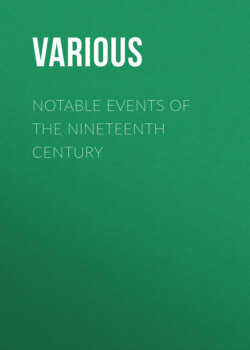Читать книгу Notable Events of the Nineteenth Century - Various - Страница 13
На сайте Литреса книга снята с продажи.
THE DOUBLE FETE IN FRANCE AND GERMANY.
ОглавлениеTable of Contents
The Third Republic of France has passed its twenty-fifth anniversary, and the German Empire has just celebrated its semi-jubilee. The French held their fête in September of 1895, and on the eighteenth of the following January all the Fatherland shouted greetings to the grandson of old Wilhelm the Kaiser. The Gaul and the Teuton have thus agreed to be happy coincidently; but for very different reasons! The Gaul has his Republic and the Teuton his Empire. Side by side on the map lie the two great powers, representing in their history and present aspect one of the strongest contrasts to be found in human annals.
What the German Empire is we may permit the Emperor himself, in his recent anniversary address, to explain. His speech shows that Germany, of all civilized nations, has gone furthest in the direction of unqualified imperialism. The utterances of Emperor William surpass the speeches of the Czar himself, in avowing all the pretensions and fictions of monarchy in the Middle Ages. The Hohenzollern potentate openly makes the pretence of governing his subjects by rights and prerogatives in nowise derived from the people, but wholly derived from himself and his grandfather. Why should Germany be an Empire and France a Republic? How could such an amazing historical result come into the world? The French Republic and the new Empire of Germany were not made by generals and kings and politicians in 1870–71. Indeed, nothing is made by the strutters who are designated with such titles. The two great powers having their centres at Berlin and Paris have their roots as deep down as the subsoil of the ages. They grew out of antecedents older than the Crusades, older than Charlemagne, older than Augustus and the Christ. They came by law—even if the result has surprised the expectation of mankind.
When Cæsar made his conquest of Europe, he found the country north of the Alps in the possession of two races—both Aryan. These two races were as unlike then as they are now. The Gauls west of the Rhine were proper material for the reception of Roman rule; but the Germans beyond the Rhine were not receptive of any rule but their own. The Gallic races became Romanized. Gaul was a part of the Roman Empire and reasoning from the facts, we should have expected the Gaulish nations to develop into the imperial form.
For like reason we should expect the Teutonic races to develop into the greatest democracy of the modern world. Contrary to this double expectation, we have a French Republic and a German Empire. In 1870 the Gallic race became suddenly democratic, and at the same time the Germans became the greatest imperialists among civilized mankind! The German Empire has arisen where we should have expected a democracy; and the French Republic has arisen where we should have expected an Empire.
The illogical Empire lies alongside of the illogical Republic. They have a line of demarkation which, though drawn on the map, is not drawn on the ground. The great antagonistic facts touch each other through a long line of territorial extent, but the ethnic diversity does not permit political union. The Teuton and the Gaul continue to touch, but they are not one, and cannot be. Two neighbors living between Verdun and Metz are only a quarter of a mile apart. They cultivate their grounds in the same manner, raise the same fruits, have vines growing on the two sides of the same trellis. They speak the same language, exchange gossip and poultry; but their children do not go to the same school! One of them is a French democrat; the other, a German imperialist!
The reason for this reversal of expectation, by which the anticipated institutions of France are found in Germany and those of Germany in France, is this: It seems to be a law of human progress that mankind moves forward by reactions against its own preceding conditions; that is, Progress disappoints History by doing the other thing! The French race has done the other thing; and so has the German race! They who should have been logically the imperialists of Western Europe are the republicans and democrats. They who should have been logically the democrats and republicans of Europe—who should have converted Germania into the greatest democracy of the world—have accepted instead the most absolute empire. The phrase "German Empire" is, we think, the greatest paradox of modern history; and the phrase "French Republic" is another like it. But history has decreed it so; and the reason is that human progress works out its highest results by doing the other thing!
But this philosophical speculation or interpretation does not trouble either the French or the Germans. They both seem to rejoice at what has come to pass, and do not trouble themselves about the logistics of history. They celebrate their quarter centennials, the one for the Republic, and the other for the Empire, with profound enthusiasm, shouting, Vive for the one and Hoch for the other with an impulsive patriotism that has come down to them with the blood of their respective races from before the Christian era!
